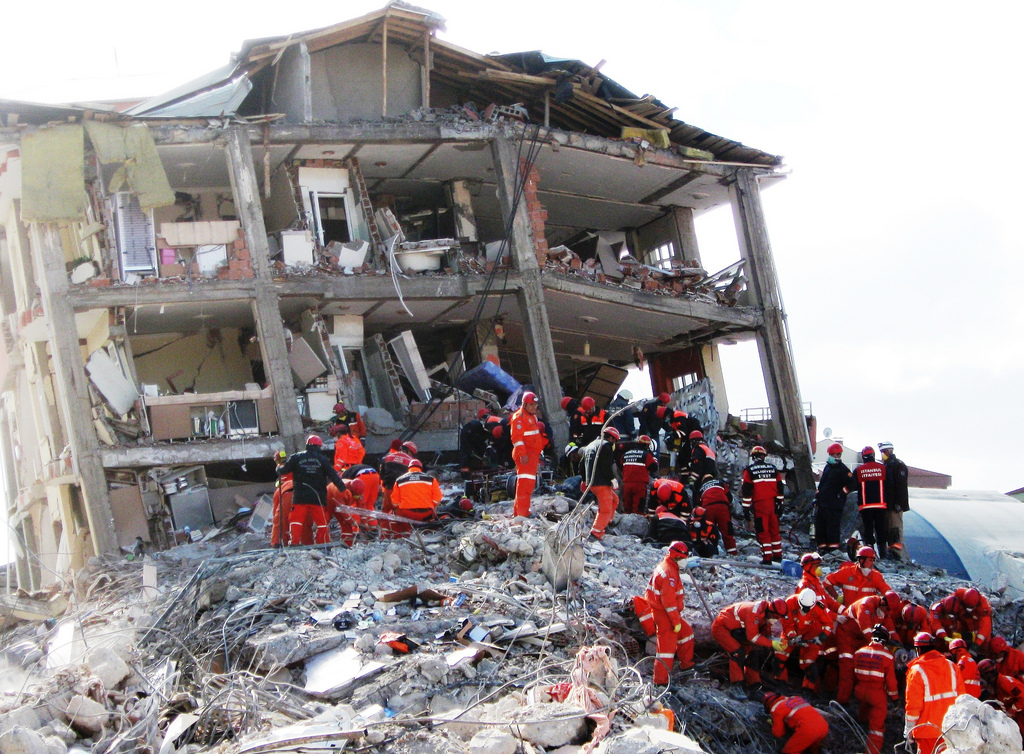This post is also available in: Français (French)
By Övgü Pınar
After the earthquakes on February 6, 2023, Turkey saw civil society trying to fill the organizational void left by the state. And among the most active are once again the women's organizations, which has been one of the most influential civil society movements in Turkey for years.
Right after the earthquakes that killed at least 50 thousand people and left around 1.5 million homeless, feminists — both independent ones and those working within various organizations — came together to launch solidarity groups to help meet the needs of women in earthquake zones.
One of them, the ‘‘Feminist Solidarity for Disaster Relief’’, sent “Purple Trucks” filled with sanitary products for women to the cities affected by the quakes. “Alongside supporting efforts to meet the survivors’ basic needs, such as food, shelter, and heating, we also endeavor to bring attention to the specific needs that women, LGBTI+, the sick, the elderly, and children have,” the group says. They emphasize that certain needs such as sanitary pads and tampons cannot be met with one-time donations ‘’but have to be made available on a continuous basis, and we work to ensure women’s access to underwear and hygiene products.”
Feminists volunteering in the affected areas denounce the fact that women’s basic needs like sanitary pads are being treated like secondary issues, as usually seen in times of crisis. Apart from basic material needs, security concerns and lack of socio-psychological support amount to worrying levels.
Another feminist organization, The Women's Defence network, set up a women’s solidarity tent in Hatay, in order to create a safe place for women, LGBT+ and children.
While the socially constructed gender-specific disadvantages of women make them more vulnerable in and after natural disasters, relief efforts tend to be mostly “gender blind”
Women living in tent cities constructed for the displaced say they are afraid of even going to the toilet on their own, even more so at night when there is not sufficient lighting. They rarely go outside the tent cities, not just out of security concerns but also because they are the ones that are mostly left to take care of children, elderly and the sick, and do the domestic chores.
Impacts of natural disasters differ widely across genders, and already existing gender inequalities are even more deepened, as various research and reports confirm.
While the socially constructed gender-specific disadvantages of women make them more vulnerable in and after natural disasters, relief efforts tend to be mostly “gender blind.”
And this makes the feminist solidarity initiatives vital, even more so in an area where the socioeconomic status of women is on the lower end and gender-based violence is high.
United Nations Population Fund (UNFPA), providing support in cooperation with local partners in temporary camps in Turkey and Syria, stress that ‘’gender-based violence protection needs soar’’ in disasters. In its call for support for women and girls in Syria and Turkey UNFPA says, “In a crisis, women and girls are also at much greater risk of violence and abuse, while social security and protection services break down and health facilities collapse.”
UNFPA set up safe spaces in Syria and Turkey to ensure “prevention and response services for gender-based violence, for tens of thousands of women and girls living in over-crowded, makeshift camps or on the streets. They are facing acute protection risks, including a greater risk of gender-based violence, exploitation and abuse, and violations such as child and forced marriage - all of which have become increasingly ‘normalized’ during Syria’s protracted crisis.”
‘We Will Stop Femicide’ Platform declared that 328 femicides were committed between March 8, 2022-March 8, 2023. And there were 233 more suspicious female deaths…
One reported case of gender-based violence came from Hatay, one of the cities that suffered heavy damage in the earthquakes. 25-year-old Alev Altun had to leave her damaged house with her two kids and take refuge at her ex-husband’s. One night she was awakened by the shock of scalding water poured over her body. While she desperately sought help from neighbors she could hear her ex-husband saying “she should thank God he didn’t kill her.”
Women’s organization ‘We Will Stop Femicide Platform’ says there are many other cases of women suffering domestic violence and abuse after the earthquakes.
The severity of concerns for greater risk of violence against women after the earthquakes could be better perceived by looking at the recent figures on femicides in Turkey. In an International Women's Day statement on March 8, We Will Stop Femicide Platform declared that 328 femicides were committed between March 8, 2022-March 8, 2023. And there were 233 more suspicious female deaths.
The center stage at women’s rallies on March 8 was given to the earthquakes and their impact on women. Women’s Platform for Equality (EŞİK), in its statement on March 8 said, “We will regenerate the cities and our hope destroyed by the earthquake with women's solidarity.”































